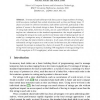Free Online Productivity Tools
i2Speak
i2Symbol
i2OCR
iTex2Img
iWeb2Print
iWeb2Shot
i2Type
iPdf2Split
iPdf2Merge
i2Bopomofo
i2Arabic
i2Style
i2Image
i2PDF
iLatex2Rtf
Sci2ools
SPIRE
2005
Springer
2005
Springer
Cache-Conscious Collision Resolution in String Hash Tables
In-memory hash tables provide fast access to large numbers of strings, with less space overhead than sorted structures such as tries and binary trees. If chains are used for collision resolution, hash tables scale well, particularly if the pattern of access to the stored strings is skew. However, typical implementations of string hash tables, with lists of nodes, are not cache-efficient. In this paper we explore two alternatives to the standard representation: the simple expedient of including the string in its node, and the more drastic step of replacing each list of nodes by a contiguous array of characters. Our experiments show that, for large sets of strings, the improvement is dramatic. In all cases, the new structures give substantial savings in space at no cost in time. In the best case, the overhead space required for pointers is reduced by a factor of around 50, to less than two bits per string (with total space required, including 5.68 megabytes of strings, falling from 20.4...
| Added | 28 Jun 2010 |
| Updated | 28 Jun 2010 |
| Type | Conference |
| Year | 2005 |
| Where | SPIRE |
| Authors | Nikolas Askitis, Justin Zobel |
Comments (0)

